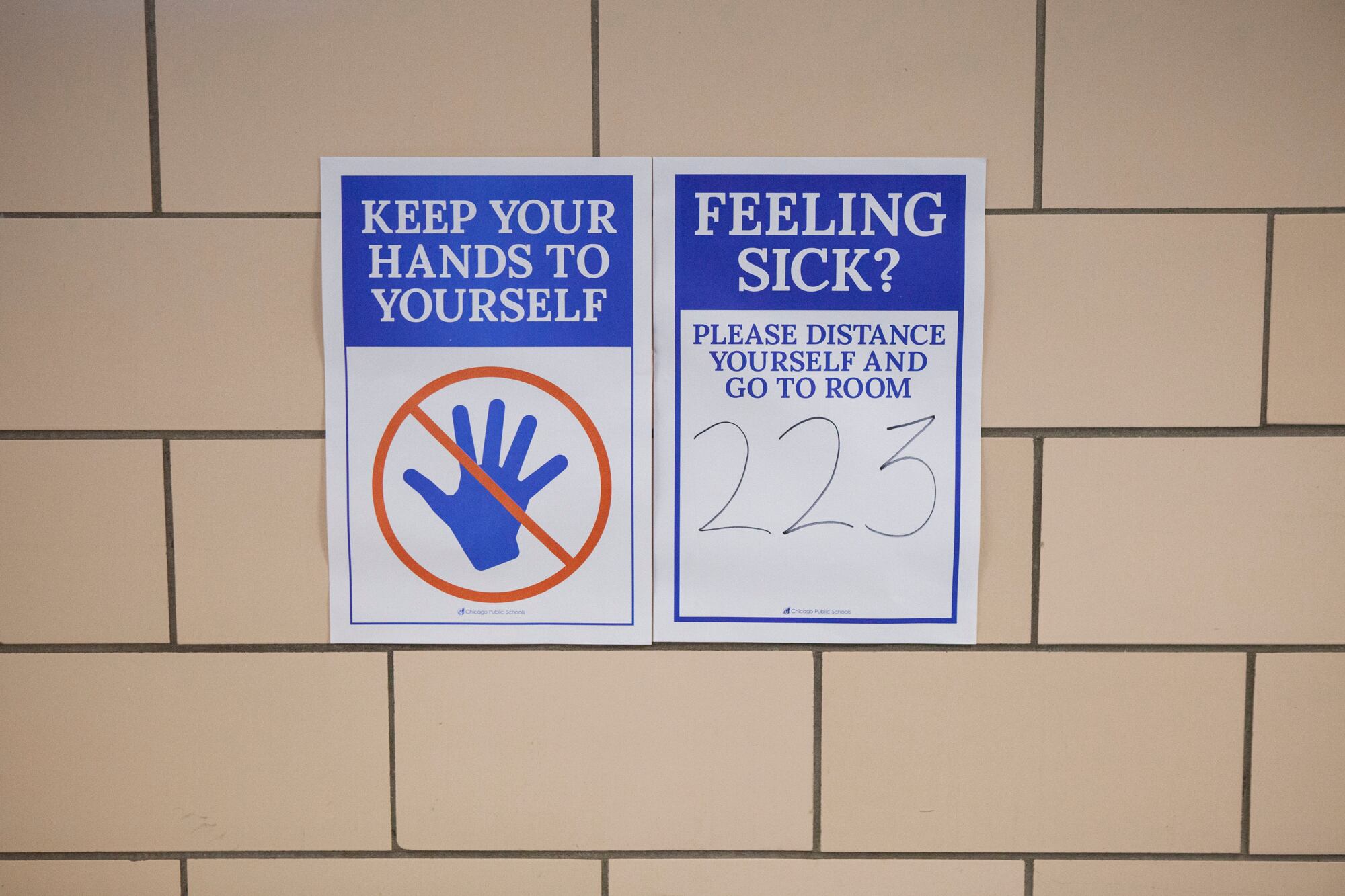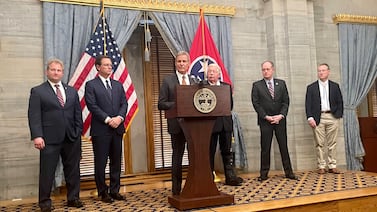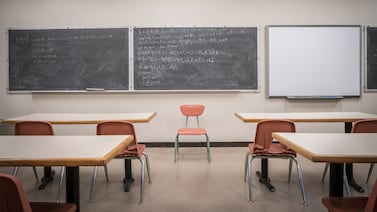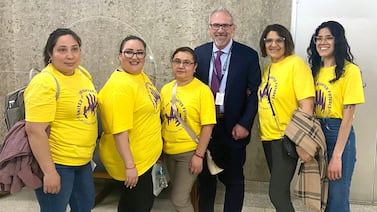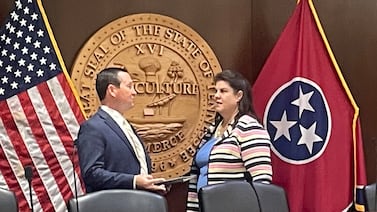Chicago Public Schools will reopen school buildings for pre-kindergarten students and some children with disabilities starting Jan. 11, with teachers set to return a week earlier, district officials said Tuesday.
Chicago will aim to bring back students in kindergarten to eighth grade on Feb. 1.
Principals were briefed by a webinar Tuesday afternoon. The district followed with a statement.
“The reality is that our Black and Latinx students, our youngest students and highest-need learners have not been equitably served,” said Mayor Lori Lightfoot in Tuesday’s press release. “The decision to begin in-person learning this January will restore their access to high-quality instruction and is the result of balancing our commitment to equity with our current public health situation.”
Chicago Teachers Union president Jesse Sharkey called the reopening dates “arbitrary” and “wholly de-linked” from public health data that show a spike in COVID-19 rates. “Just unilaterally picking an arbitrary date in the future and hoping everything works out is a recipe for disaster,” Sharkey said in a statement.
While school officials acknowledged a rise in COVID-19 rates, where the rolling seven-day rate neared 16% in Chicago, they said efforts to mitigate spread in schools had been successful in other states, as well as Europe.
As more data emerges from child care centers, private and parochial schools, day camps, and other districts throughout Illinois that have reopened, city health officials have frequently said the risk of transmission in school settings appears to be low. Data obtained by Chalkbeat earlier this month seems to support that, but it did not paint a full picture since it had a cutoff date of Oct. 17, before the latest spike.
Earlier Tuesday, the city’s top public health official, Dr. Allison Arwady, shared more recent data showing that, as community cases have climbed, child care centers and private and parochial schools have reported more cases. In one week, 200 cases were reported across 111 facilities. The majority of school cases were connected to out-of-school contacts, but at least one day care center had reported an outbreak, according to a public health chart.
Recognizing rising rates, the district said it will again survey parents of pre-kindergarten students and special education students to gauge whether they will choose the in-person learning option. About 34% of pre-kindergarten and special education parents who responded to earlier surveys said they would choose an in-person learning option, the district said. Parents will continue to have the option of continuing to learn remotely.
Officials have not said how a spate of labor court challenges filed by the city’s teachers’ union could affect its plans. Among 6,800 pre-kindergarten and special education teachers and providers, the district said Tuesday that 28% had submitted formal requests for accommodations or requested leave as of mid-November. An earlier round of “intent to work” forms showed 42% of teachers would return without seeking an accommodation.
Chicago had originally intended to phase-in learning for students later this month. Its announcement to delay reopening comes as several other large school districts across the country have pulled back on reopening plans as rates of COVID-19 have spiked. In Philadelphia, school officials reversed plans to reopen buildings to young students after Thanksgiving. Sacramento, San Diego, Baltimore, and Washington D.C. have all similarly delayed reopening within the last week or so.
New York City, which opened schools in September for some in-person learning, has warned parents that schools could go all-virtual again, but it continues to keep most campuses open.
National data suggests schools aren’t major sites of virus transmission, particularly in the earlier grades. Outbreaks have been relatively rare as some schools reopened this fall. But one key to a safe reopening is community spread. Children can spread the virus, and in communities with high rates of COVID-19 it can be challenging to limit transmission.
School districts across the country have chosen different metrics on which to base their reopening decisions. (In New York City, the threshold for closing schools is a seven-day positivity average of 3%, while in Jefferson County schools, one of Colorado’s largest districts, schools have remained open even as positivity rates eclipsed 10%.) But nationwide, pressure from rising rates has put pressure on school districts to rethink their plans.
Meanwhile, some other large urban districts such as Houston Independent and Miami-Dade have continued with in-person learning, choosing to close classrooms or individual campuses when multiple cases are reported.
In Tuesday’s announcement, the school district said public health officials will consider an additional metric when they evaluate whether schools can safely reopen at the start of the year. Earlier reopening plans cited daily case counts and rolling positivity rates; now Chicago said it also will examine “case doubling time” — that is, the number of days it takes newly diagnosed cases to double.
A rate of 18 days or more would be considered moving in the right direction, whereas the current case doubling time is 12 days.
Potential headwinds
Two potential challenges to the district’s plans could be rising COVID-19 rates and objections from the city’s powerful teachers union.
Throughout the fall, Lightfoot and schools chief Janice Jackson have stressed the need to return children to school buildings, arguing that the long-term academic risks to children must be considered along with COVID-19 case counts.
In some neighborhoods on the South and West sides of the city, positivity rates are considerably higher than the city’s 16% average.
The city’s teachers union has frequently cited the disparity in COVID-19 rates in its rationale for arguing against an in-person return. And it has said that the district’s promised safety precautions don’t go far enough to address the risks to educators and students alike — particularly Black and brown students from those neighborhoods where positivity rates have reached 20% or higher.
The union has asked for more clarity and availability in COVID-19 testing, a more thorough plan for contact tracing should cases arise, and permission to send in independent ventilation experts to verify air quality reports (the latter is a request that the district has denied).
In response to the district’s announcement Tuesday, the union again criticized district leadership and the mayor for not consulting educators in developing the plan. “This mayor says the buck stops with her, and that she would lead during the pandemic with empathy and science, but returning thousands of people to schools as COVID rages is far from empathetic, and the science is unclear,” Sharkey said.
The union has tried to air its grievances through labor courts, but those efforts have not yet won a written agreement, or pushed the district to comply with any final rulings. In one case, a labor court official declined to rule on a case over whether the district had to bargain with the union until a reopening date was set — an opinion the district considered favorable. But in another case, an arbitrator sided with the union over whether school clerks could work remotely.
The district has since said that it will continue to ask clerks to come to school buildings, raising questions about what consequences, if any, Chicago Public Schools faces if it does not adhere to a labor board ruling.
Mila Koumpilova and Yana Kunichoff contributed reporting.


